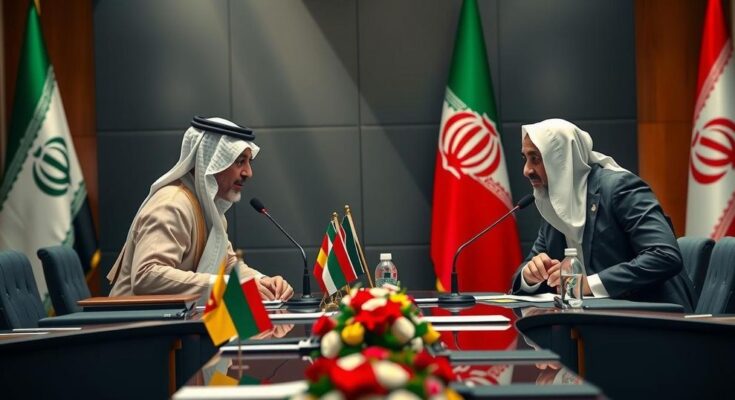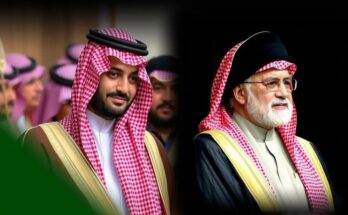The BRICS Summit in Kazan saw the first meeting between UAE leader Sheikh Mohammed bin Zayed Al-Nahyan and Iranian President Masoud Pezeshkian, aimed at easing tensions over three disputed islands. The discussions included the Gaza conflict and a reaffirmation of Iran’s claims to the islands, amid international calls for a cease to hostilities. Both countries expressed a desire to approach regional security collaboratively.
During the recent BRICS Summit held in Kazan, Russia, a notable event occurred as Sheikh Mohammed bin Zayed Al-Nahyan (MbZ), the leader of the United Arab Emirates (UAE), met with Iranian President Masoud Pezeshkian for the first time. This meeting was aimed at addressing longstanding tensions concerning three strategically significant islands in the Strait of Hormuz—Abu Musa, Greater Tunb, and Lesser Tunb—occupied by Iran since 1971. The discussions took place amid heightened regional conflicts, including violence linked to the ongoing Gaza war. In their talks, MbZ and Pezeshkian also deliberated on broader geopolitical matters within West Asia, notably the conflict in Gaza and Lebanon. Following a joint statement by the European Union and the Gulf Cooperation Council, which called for Iran to relinquish its control over the three islands, Iranian officials reiterated Iran’s sovereignty over these territories. Iranian Foreign Minister Abbas Araghchi affirmed that their discussions included the status of the islands while firmly restating Iran’s claims. Despite these tensions, both leaders highlighted the necessity to halt the assaults by Israeli forces on Gaza and Lebanon. Furthermore, the BRICS Summit provided a platform for significant diplomatic exchanges, including a meeting between Foreign Ministers Araghchi and Sheikh Abdullah bin Zayed Al-Nahyan, which also focused on maintaining regional peace amidst escalating conflict and military actions in the region. The UAE’s increasing engagement and its normalization agreement with Israel have raised concerns for Iran, particularly in light of Iran’s support for groups opposing Israel’s military presence in the region. The meeting signified a cautious attempt at thawing relations between the two nations against a backdrop of external pressures and conflicts.
The recent BRICS Summit has emerged as a pivotal moment in Middle Eastern diplomacy, especially for relations between Iran and the UAE. Historically, tensions between the two countries have stemmed from Iran’s occupation of three strategically located islands after the British withdrawal from the region. These tensions have been exacerbated by conflicting regional interests, including the ongoing Israeli-Palestinian conflict and the UAE’s normalization of diplomatic relations with Israel under the Abraham Accords. This increasingly complex geopolitical landscape necessitates dialogue to address both historical grievances and current conflicts in the region, making the recent meeting at the BRICS Summit significant.
The meeting between Sheikh Mohammed bin Zayed Al-Nahyan and President Masoud Pezeshkian during the BRICS Summit highlights an important diplomatic step towards easing tensions between Iran and the UAE. While the discussions encompassed broader regional security concerns, particularly relating to the Gaza conflict and the disputed islands, both leaders emphasized the need for peace and stability in the region. The engagement signals a recognition of the necessity for dialogue as both nations navigate their respective interests amidst ongoing regional upheaval.
Original Source: www.newarab.com




